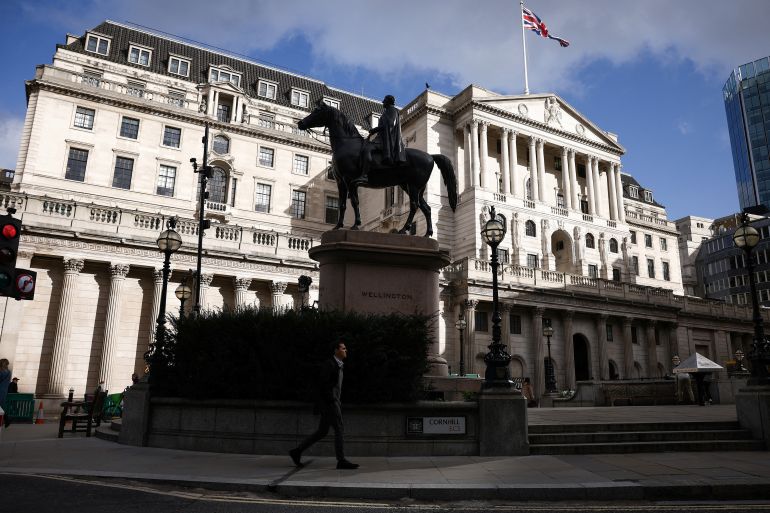Bank of England raises interest rates to 4.25%
The UK’s central bank announces 11th consecutive interest rate increase as it focuses on fighting inflation.

The Bank of England (BoE) has raised interest rates by a further quarter of a percentage point and says it expects the surge in British inflation to cool faster than before despite a surprise jump in price growth last month.
The United Kingdom’s central bank on Thursday raised its benchmark bank rate by 25 basis points to 4.25 percent. The BoE’s nine rate-setters voted 7-2 for the decision as they sounded more upbeat about the outlook for the country’s sluggish economy.
Keep reading
list of 4 itemsLebanese take to streets as anger over economic meltdown grows
Celebrities Lindsay Lohan, Jake Paul charged for promoting crypto
US bank failures ‘very different’ from 2008 crisis, Yellen says
That was the central bank’s 11th consecutive increase in borrowing costs, which began in December 2021.
The bank’s Monetary Policy Committee made the decision after the UK statistics agency surprised policymakers on Wednesday by reporting that inflation accelerated to 10.4 percent in February, driven by the cost of food, clothing and dining out.
The bank will “continue to monitor closely indications of persistent inflationary pressures”, it said in announcing its decision. “If there were to be evidence of more persistent pressures, then further tightening in monetary policy would be required.”
Still, Thursday’s was the smallest rate hike since June as the Bank of England forecasts a steep drop in inflation later this year. Inflation is expected to slow to 2.9 percent by the end of the year as energy costs fall and big price increases that were recorded last year drop out of the calculation.
Al Jazeera’s Paul Brennan, reporting from London, said the BoE is no longer predicting the UK economy will go into a recession.
“There is an expectation that the economy will grow … slightly within the next year, a little glimmer of hope there,” Brennan said.
“They also expect energy prices or the energy price contribution to inflation to turn negative during the course of this year,” he said. “We have the Ukraine war, which bumped up the price of energy, namely Russian gas, because of the shortage of that. That is expected to come out of the inflationary pressure over the next year, those pressures easing as people find alternatives.
“There are concerns as central banks around the world continue to try to put the brakes on inflation. It might spill over into a wider recessionary pressure on the economy. So it’s a very delicate balancing act that the central banks are trying to tread.”